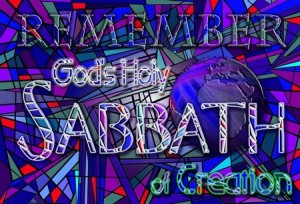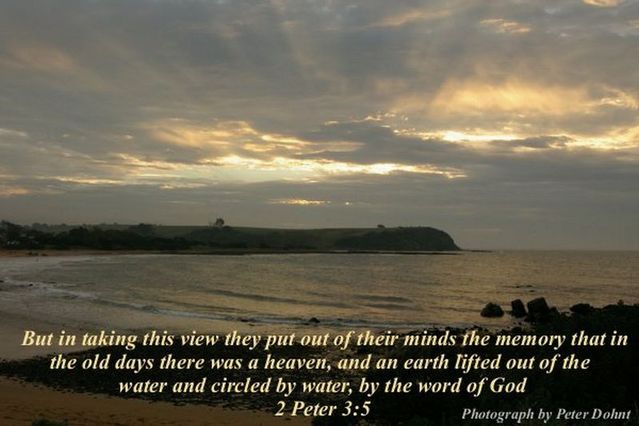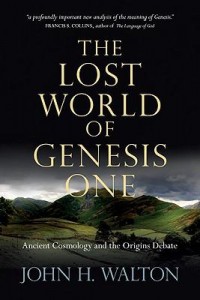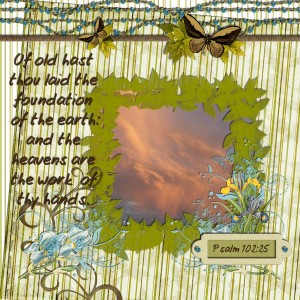Four Questions – Part 1- How long are the days in Genesis
A student at Liberty University was given the following four questions as part of a required class. He sought my answers. With his permission, I am sharing his questions and the combined answers, including mine, from the members of the “Celebrating Creation through Natural Selection” Facebook group. The Liberty university student also had a few follow up questions that he asked to clarify our views and to satisfy his own curiosity. I’ll include those and our combined answer to them as well. The young man respectfully thanked us for our time. While I do not agree with the young earth doctrines taught by Liberty University and Answers in Genesis, I think it’s wonderful when folks ask questions like these. It gives us an opportunity to discuss scripture and address the young earth doctrines that cause some to reject evidence and cause others to reject Christianity.
The questions –
-How long are the days in Genesis 1?
-How old is the earth and life and why?
-Did man and apes come from a common ancestor?
-Were Adam and Eve real people?
Follow up questions –
-How does holding an allegorical view of Genesis affect theology?
-How does an evolutionary process of death and survival of the fittest harmonize with what the Bible seems to teach about death entering the world through sin? Are the views possible to reconcile?
– One of the biggest things that Biblical creationists believe is that an evolutionary world view will lead to a secular world-view (rejecting God) an the devaluing of Human life, leading to genocide, eugenics, abortion, etc.. What would be your response to this? Do you feel that the evolution based curriculum taught in public schools carries bias that would lead to this?”
Part 1-
How long are the days in Genesis 1?
We are devout Christians. We are among the many Christians and majority of denominations worldwide who accept the findings of modern science. We look to Genesis for its profound statements on the relationship between God, Man, and God’s Creation. We also believe that God is the author of all things including the natural processes in his creation and that we can come to understand Gods work through science.
We look to God’s Creation as the Book of God’s Work, and we look to the Bible as the Book of God’s Word. We consider the Bible to be the inspired, authoritative, and sufficient Word of God on faith and salvation. (“All Scripture is God-breathed and is useful for teaching, rebuking, correcting and training in righteousness.” 2 Timothy 3:16)
We also consider the Bible to be a signpost to Jesus who is the Living Word of God.
 (Jesus – The Logos – The Living Word of God.)
(Jesus – The Logos – The Living Word of God.)
I believe, as do most Christians who accept the evidence God has provided in nature, and as did many Christians prior to the discoveries of the ancient age of the earth, that Genesis is meant to illustrate theological points and has non-scientific meaning too large to be limited to a simple history.
According to the young earth doctrine one should be able to start with the seven days of the Genesis account and by filling in any gaps in the stories in the Bible derive a length of history, including the history of the earth, life on earth and the universe. The age of the earth that is calculated by folks who hold this view varies between 4,000 and 16,000 years. It is important to a young earthists that the first seven days, be roughly equivalent to a 24 hour day. This is part of their calculations. Many feel that reading Genesis one and two as theological illustrations undermines the whole of the Bible. Some claim that no part of the Bible should be read as other than a history book, although when questioned they do read parts as parable and illustrations. They disagree on which parts are to be interpreted in which way. Some claim that their interpretation is the word of God.
There are very, very good scientific reasons to accept that God has been creating our earth for a long time. A very young earth does not match the literal mountains of evidence that God left for us, but let’s just limit this discussion, for now, to the biblical and theological reasons to accept that Genesis was not meant to be read as science or a newspaper account. If you are interested in some of the fields of science and methods that independently confirm that life, the earth and especially the universe are ancient, you might read Young and Stearley’s The Bible, Rocks and Time .
The shortest answer to the question “How long are the Days in Genesis?” is this. It does not matter how long the days in Genesis were. The two accounts of creation in Genesis are not meant to be modern calendar histories or science textbooks. They have a bigger purpose and larger meaning, expressed in a parable.
Reasons that Genesis 1 days should not be read as literal days.
Most Christian churches have thought, since long before Darwin, and some have always thought that the days in Genesis are part of an illustration or parable. As such, the length of the days in the parable is irrelevant.
If one tries to read the days of Genesis one as a strictly concrete literal history, the two accounts in Genesis contradict each other. Some young-earthists have devised methods to harmonize the two accounts, but doing so requires the introduction of extra-biblical ideas and does not constitute a literal reading.
The first three “days” of Genesis are without definition if the “days” are read as literal calculations of the length of creation. The sun and the celestial bodies were not created until later in the creation week. We measure an Earth day by the rising and setting of the sun. What is a day in Genesis, when there was not yet a sun?
Origin of Alexandria, who was one of the men most responsible for the collection of the canonical New Testament and recommending which OT and NT books should be considered for the Christian Bible, said this…
“For who that has understanding will suppose that the first, and second, and third day, and the evening and the morning, existed without a sun, and moon, and stars? And that the first day was, as it were, also without a sky? And who is so foolish as to suppose that God, after the manner of a husbandman, planted a paradise in Eden, towards the east, and placed in it a tree of life, visible and palpable, so that one tasting of the fruit by the bodily teeth obtained life? And again, that one was a partaker of good and evil by masticating what was taken from the tree? And if God is said to walk in the paradise in the evening, and Adam to hide himself under a tree, I do not suppose that anyone doubts that these things figuratively indicate certain mysteries, the history having taken place in appearance, and not literally.”
-Origen of Alexandria in De Principis
It’s also clear across the Old Testament that the OT writers did not consistently use numbers and figures of time as we do now. Rather, they used them descriptively. An article that I wrote lists some of the verses that indicate that Old Testament writers saw the earth and universe as ancient or as at least much older than the YE view allows and points to some of the problems with biblical exegesis that a literal 7-day recent creation runs into.
If one attempts to force the Bible into a strict literal time line or calculate the age of the planet earth from the Bible, starting with Genesis, one eventually has to ignore parts of what the Bible has to say.
In example, I do not think that it is possible to create an accurate genealogy from Adam to Jesus without making many guesses and additions to the timeline. This is despite the many attempts through the years to do so. It does not appear that the writers were interested in writing a modern genealogy.
I recently noticed young- earth folks presenting the idea that the two differing versions of Jesus genealogy should be combined by considering one of them to be Marys genealogy. Although this is a popular idea, it requires ignoring the statements in both versions that each is Josephs genealogy. Building a case for absolute literalism and a young earth requires ignoring inconvenient parts of the Bible.
Some folks have suggested that fossil evidence, distant starlight and other genetic, physical and geological evidence can be explained as the work of the devil. Doesn’t that give the devil a great deal of power? It seems that the devil would then be the creator.
In addition, the Hebrew term ‘yom’, which we translate as “day”, has multiple meanings, as the word day has more than one meaning in English. Many scholars read the word in the Hebrew text (yom) as ‘period of time’, as we would say “in the day” in English. Some young-earthists state that the use of a number before “yom”, such as “on the second day” requires that the days in Genesis be a 24 hour dawn to dusk day. There simply aren’t enough uses of “yom” with a number before it to stipulate this. In order to create a literal seven days of creation, one has to make an assumption about the meaning of scripture, which may not be justified.
There are ancient writings, some of which predate Christianity, that illustrate that at least some ancient Jews did not expect Genesis to be read as a specific history of our creation. Philo of Alexandria, a 1st-century Jewish scholar, stated that the number of days in the creation week had symbolic significance for Moses, as six was a “perfect number” – thereby signifying the beauty of God’s creation – and furthermore said that “it would be a mistake to think that creation happened in six days or in any determinate amount of time.”
But, regardless of whether Yom is meant to be read as non-specific periods of time or as 24 hour days, a factual answer to the question “How long are the days in Genesis 1?” is theologically unimportant in most Christian faith traditions. Genesis is meant to point to Jesus, not to tell us the mechanics of creation.
A major theological Problem with requiring Genesis 1 to be read as a literal history.
To my mind, the biggest theological problem with turning Genesis into literal scientific/ historical modern style narrative is that it robs the cross of it’s significance and power. If sin is boiled down to a genetically inherited condition, due to Adam and Eve eating a fruit, as opposed to the classical understanding of sin as the capability of any human to choose evil behavior, then we are not individually responsible for our own sin. In that case Adam and Eve are responsible for our sin. If Genesis must be strictly literal, the cross does not have individual redemptive meaning. Why would Christ need to redeem you and me from one couples’ failure.
Why is Genesis written in a six days of creation format? What is it telling us?
Many scholars believe that the importance of the specific 6 days of creation is that God creates everything with simple commands and that the 6 of creation and one of rest match and are meant as a contrast with the creation stories in the nearby civilizations of the time.
The Israelites were surrounded by and conquered by peoples with polytheistic religions. They lived in a kind of crossroads of civilization. The creation stories of these civilizations included very anthropomorphic multiple gods. Some of these Gods were celestial objects, such as the Sun, or other parts of creation. The elements of the universe these Gods created seemed bigger than the Gods themselves, when they were not themselves Gods.
In contrast, our God of Genesis was not a celestial or earthly object. The universe God creates is not greater than God. He is one God. He created the moon, the sun, the oceans, the land and all that we see. The God of Abraham, creates that which others would consider Gods. And, he does this with authority, taking only a few days for each major important aspect of creation. The Sun and Moon, deities in the neighbors religions are simple “utility lights” in God’s Creation. They are aspects of God’s creation, not gods in themselves. Further God creates all of this in order to provide for companions who can relate to him. Ancient Jews and their neighbors would have been likely to have seen the two Genesis creation week accounts as matching the neighbors creation myths with these glaring differences. There is one God. He created all things and precedes them.
Another idea about the purpose for the specific seven days in Genesis has been held as a doctrine through most of the history of Christian theology and most denominations. In this view the days in the Genesis account represent a temple cycle and are there to establish a day of rest/ worship.

What is Genesis about? What do we take from it?
So the important question that would be asked by most Christian faith traditions is the one we ask about all of scripture, which is, “what does that have to do with the Resurrection?” I know that may sound like a distant place to start when reading scripture, but we read the Bible though the lens of the gospel of grace, what is revealed to us through Jesus. Most Christians believe that the whole of the Old Testament serves as an introduction to Jesus. Many of our Jewish brothers claim that the Torah simply establishes that there is one God, a God of justice and mercy, gives their story and sets proper relationship with God.
What we get from the “6 days” aspect of Genesis is not a science or history lesson, but a theology lesson about the relationship between God and his Creation. Although it appears to us that the universe is 13.57 billion years old, the “6 day” aspect of Genesis tells us that regardless of the process of how God is unfolding the universe from the beginning to the end, it is a process that is under complete control of God such that if he had wanted to make it all suddenly appear fully formed in 6 days he could have done that as simply as he is doing it over billions of years.
Way back when the early geologists, many of whom were pastors and most of whom were Christians began discovering the geological evidence that the earth was ancient, they were delighted.
This harmonized nicely with the Bibles many statements that the foundations of the earth were laid “of old” and the hills were “ancient.” This also put an end to a then popular atheistic notion that the universe and the earth had no beginning.
Acceptance of an ancient earth spread rapidly. Long before Darwin there were few young earth churches. Todays young-earth movement is itself a very young phenomenon. It’s fortunate that the seven literal days are not theologically or biblically required, as the evidence since the 1700s has continued to build from many sources that the earth is far older than the 4-10,000 years allowed by the young earth view.
In Genesis, God provides a powerful and poetic parable, couched in the mythological language of the ancient Middle Eastern world, that tells us about God, his creation and our relationship with God. The Reverend Billy Graham said this well.
“I don’t think that there’s any conflict at all between science today and the scriptures. I think that we have misinterpreted the Scriptures many times and we’ve tried to make the Scriptures say things they weren’t meant to say, I think that we have made a mistake by thinking the Bible is a scientific book. The Bible is not a book of science. The Bible is a book of Redemption, and of course I accept the Creation story. I believe that God did create the universe. I believe that God created man, and whether it came by an evolutionary process and at a certain point He took this person or being and made him a living soul or not, does not change the fact that God did create man. … whichever way God did it makes no difference as to what man is and man’s relationship to God.”
–Billy Graham “Billy Graham: Personal Thoughts of a Public Man”, 1997. p. 72-74
Category: Uncategorized








